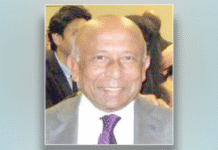By Commentary by Ali Riaz on Jan 03, 2024 Benar News
The Narendra Modi government in India has reiterated over the past two months that the upcoming general election in neighboring Bangladesh is its own business.
There has not been a peep out of New Delhi in response to allegations by human rights advocacy groups about rampant rights violations and the muzzling of free speech in the lead up to the Jan. 7 polls, or Western governments’ repeated calls for a free, fair and inclusive contest.
“The election is a domestic matter of Bangladesh, and we believe it is the people of Bangladesh to decide their own future,” a spokesman for the Indian foreign ministry said as recently as Dec. 29.
The statement can really be seen as an affirmation that India will keep standing by Prime Minister Sheikh Hasina’s government in Bangladesh, with which New Delhi has forged a close bond politically and in business since 2009.
That support has persisted despite the next-door neighbor’s descent into what some call a “moderate autocracy,” under Hasina.
And it looks set to continue, with a former Indian envoy to Dhaka recently saying that no country had the right to judge Bangladesh’s election process because it had its own way of doing things.
Pankaj Saran, the former ambassador during the election that Hasina won in 2014, delivered an impassioned defense of its electoral procedures on a visit to Dhaka last month.
“We recognize that every country has its own method, its own system. … You have your election the best way that you can. You have your institutions, you have your media, you have everything,” Saran said at an event.
“I do not think it is for any country in the world, including India, to talk about how elections should be conducted either in Bangladesh or any other country. … Otherwise, what is the meaning and concept of independence and of being a sovereign nation.”
Back in 1971, India, the world’s most populous democracy, fought alongside Bangladesh in its war of independence from Pakistan.

What the former Indian envoy failed to mention was that Sunday’s election would be a bald-faced, undemocratic exercise, with the opposition sitting out the polls in protest and handing Hasina a fourth consecutive term in power.
He also failed to mention that Bangladesh’s “own method” and “own system” of elections comes with a violent crackdown on opposition members, including jailing thousands of them and convicting more than 1,500 over the past weeks.
China’s deep footprint in Bangladesh
These comments and his Dhaka visit were the clearest indications on where the Indian establishment stands – a position shared by many Indian analysts who have been arguing ad nauseum for months that New Delhi must do everything to ensure Hasina stays in power.
The Indian establishment and the country’s analysts support the Hasina regime based on two considerations: India’s security concerns, and the growing influence of China.
Indian analysts argue that a victory for the opposition Bangladesh Nationalist Party (BNP) would lead to the rise of Islamists and pose a security threat to India’s restive northeastern states. (Of course, there’s a tacit acknowledgement in this argument that a free and fair election would deliver a victory to the opposition BNP had it not boycotted the contest.)
It is ironic that India’s ruling Bhartiya Janata Party (BJP), which with “Hindutva” espouses religion as a political ideology, disapproves of a similar religious party in politics in Bangladesh.

Meanwhile, Bangladesh’s relationship with China has undergone a sea change as the latter has established a deep footprint in the South Asian nation.
Bangladesh joined China’s Belt and Road Initiative (BRI) in 2016. In addition to selling Bangladesh two submarines, China is constructing a U.S. $1 billion base for these submarines in Kutubdia.
China has also made investments in several large infrastructure projects, continued its weapons sales and made promises to invest U.S. $38 billion in projects in the South Asian country.
This increased Chinese presence in Bangladesh doesn’t sit well with India or the United States.
Washington in recent years has engaged more directly with smaller South Asian countries in its efforts to counter Beijing’s influence. The U.S. insistence since 2021 that Bangladesh must ensure a free and fair election is tied to this engagement.
However, India’s policymakers are concerned that the U.S. insistence on democratic principles will push Bangladesh even more towards China.

India competes for business
What could explain this odd divergence between the two Quad partners who are otherwise aligned on Indo-Pacific security vis-à-vis China?
India’s own ambitions provide a hint.
For one, India has grand ambitions to be a regional leader.
It has viewed South Asia as its backyard since the 1950s and would like to continue to have unrestricted influence over the region’s countries. Its approach towards Nepal, Sri Lanka and the Maldives over the past decades are indicative of this view.
India does not want the U.S. to take a leading role in South Asia.
As one Indian analyst recently pointed out: “This [the U.S. role] is likely to violate the unsaid key terms of India’s cooperation with the United States: Respect Delhi’s security and status as the leading power in South Asia.”

Second, follow the money.
Over the past decade, Indian businesses, particularly those whose owners are close to the Modi government, have received preferential treatment in investing in Bangladesh. The Adani group’s investment in Bangladesh’s energy sector is one obvious example.
Meanwhile, the U.S. is already the largest source of foreign direct investment in Bangladesh.
A better Dhaka-Washington relationship is likely to bring more U.S. investments to Bangladesh and create competition for Indian business interests.
Amid these regional and global pushes and pulls, will China, India or the U.S. prevail over Bangladesh?
While that remains to be seen, what is certain is that after this sham election, Bangladesh’s foreign relations will be reframed and realigned.
Ali Riaz is a distinguished professor of political science at Illinois State University and a non-resident senior fellow of the Atlantic Council. The views expressed here are his own and do not reflect the position of Illinois State University, the Atlantic Council, or BenarNews.









